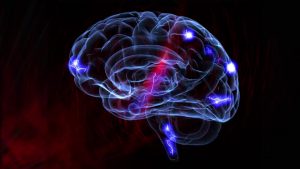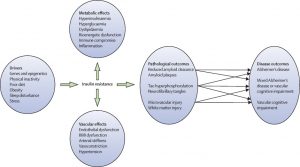
What are some unlikely pairings that you have come across in your life? One that comes to my mind right away are sour cream and onion chips. These are two things individually I cannot stand on their own, but together it’s brilliant. Or I think about my teammate who was an English and Math major. These two things just simply should not go together, common sense would tell us the brain cannot be good at both those things. More surprising than either of these to me, is the connection between type 2 diabetes and Alzheimer’s disease (AD). This is a pairing, on the surface, that also seems as if it could not be. Research suggests, however, a deep connection between the two conditions exist that impacts millions around the globe.
Insulin in The Brain
When you think insulin, the first thing that generally comes to mind is blood sugar. However, Insulin also plays a significant role in brain functioning. There are specialized receptors in the brain that insulin binds to that can regulate genes, help protect the brain, facilitate neuronal grow and survival, while also assisting in neuroplasticity. Knowing what insulin does in the brain, and that there is a deficiency in Type 2 diabetes, a picture that brings the two together begins to take shape. Not enough insulin, or an inability of Insulin to bind to its receptors, means major problems within the brain. The figure below gives a nice overview of the myriad of issues that can take place, and you can see the list above is by no means exhaustive. The signaling cascades within neurons are disrupted meaning neurons do not properly develop, and they can even die. Insulin signaling also contributes to the continuation of amyloid plaques and neurofibrillary tangles that are two classic markers of AD. Furthermore, cells that die off and do not function properly, contributes to some of the typical symptoms that are seen in AD. These include the memory difficulties and confusion occurring because of cell death and the build up of plaques and tangles.

If insulin is the problem, why not just give Insulin?
Some fascinating studies have been conducted examining Insulin as a treatment for AD. These studies have shown remarkable measures of cognitive improvement after administering either a nasal or IV dose of insulin. It makes sense that if there’s not enough insulin in both type 2 diabetes and AD, giving insulin could be an effective treatment. This turns out to be the case but there is a catch. Insulin can improve cognitive functioning in patients with AD, but also can do the same for healthy, neurotypical individuals. The symptom improvement is good news, but there is little evidence that it can stop the formation of the plaques and tangles, as well as ultimately cell death. With many having Type 2 diabetes already on Insulin, it can be very difficult for researchers to piece apart what cognitive improvements can be attributed to insulin as opposed to outside causes. Like many things with AD, the data remains unclear.
Bringing it Together
The relationship between AD and type 2 diabetes is very complex to say the least. However, in both diseases’ insulin seems to be a major player. Not enough insulin, and insulin resistance means problems for both the brain and body. This unlikely coupling is perhaps one of the most important looking ahead to how we can alleviate suffering around the globe.